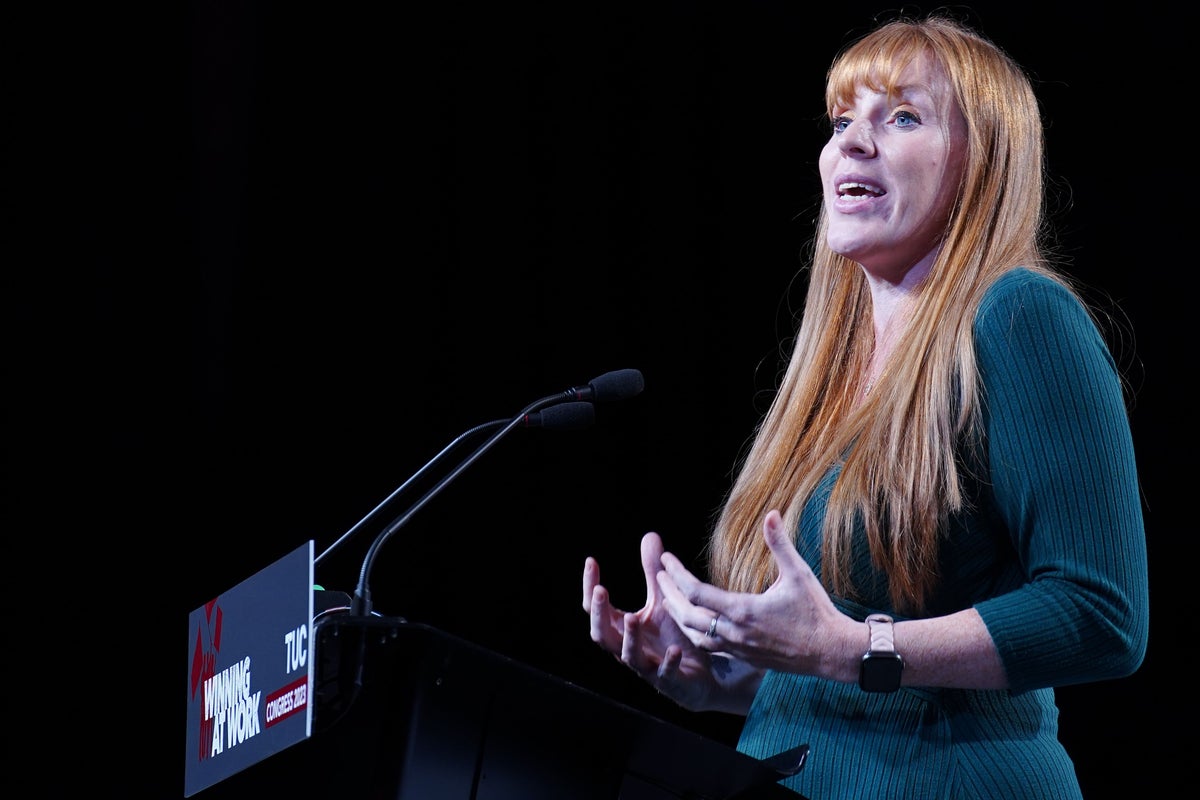
The Labour Party has unveiled new plans to clamp down on sexual harassment in the workplace as new figures show almost five million women experience such behaviour at work each year.
New proposals unveiled by Labour’s deputy leader Angela Rayner would legally force employers to “stop sexual harassment before it starts” by implementing measures to prevent sexual harassment from taking place.
Ms Rayner, shadow levelling up secretary, told The Independent sexual harassment was “rife” as she warned such behaviour is “destroying careers and ruining women’s lives”.
Speaking before Labour Women’s Conference on Saturday, Ms Rayner said that the cases which have recently grabbed headlines “are just the tip of the iceberg when it comes to the experiences of millions of women in workplaces the length and breadth of Britain”.
The latest data from the government equalities office reveals that three in 10 women currently in work suffered some form of sexual harassment at work or in a work-related environment in the last year.
Labour’s analysis of the data estimates some 4.7 million women per year are forced to endure sexual harassment at work – with 17 per cent of those who are harassed choosing to move to another job after enduring sexual harassment each year and 41 per cent of perpetrators experiencing no sanction.
The new duty will be bolstered by a statutory code of practice on sexual harassment and harassment more broadly, which establishes what actions employers must take to meet the obligation. Labour said this could comprise “effective and well-publicised policies and procedures on dealing with sexual harassment at work, providing training and assessing foreseeable risks”.
Ms Rayner argued that “everyone should be able to go to work safe from sexual harassment, knowing their employer has taken steps to create a safe working environment”.
She added: “Good employers are already creating workplace cultures that do not tolerate sexual harassment and take steps to prevent it on their watch. Labour will ensure that happens across the board.”
Labour explained their new proposals would mean employers would be responsible if they are informed of an incident involving sexual harassment, yet do not take measures to tackle it or it emerges they did not take preliminary measures to prevent the incident in the first place.
When asked about Labour’s plans by The Independent, the government insisted it was backing a new piece of legislation that would introduce identical measures to tackle sexual harassment.
It was reported earlier this year that ministers would allow the worker protection bill – a private member’s bill introduced by Lib Dem MP Wera Hobhouse and supported by Labour – to fall after a slew of amendments were tabled by Tory peers.
The legislation is due to return to the House of Commons on 20 October to be considered and voted on.
Malina Dabrowska, a designer, told The Independent a man sexually harassed her on a quiet bridge late at night after work drinks in central London when she was working in architecture in her twenties.
The 33-year-old said: “I was on my way home and someone started talking to me. I didn’t realise it was my colleague. The next thing I knew, he was all over me, trying to kiss me. He just appeared out of nowhere.
“He kissed me on my lips. He forced his face on mine. He tried grabbing me. I pushed him away. I thought woah what is happening. I turned away to get to the road and I hailed a cab.
“I was in an unsafe place under a bridge in Charing Cross. It was dark – no one was there. I was so shocked. I couldn’t compute, we hardly talked that evening. It was so out of the blue.”
She explained that she made a complaint about her colleague a few months later and was told she should report it to an external human resources person or go to the police.
Ms Dabrowska added: “For all those months, I had to work with the person in that office. It was small enough for me to be in the same space with him every day. I just completely avoided him.
“Nothing happened to him. He was called in for a telling-off. A few months later he left the workplace. It felt like there were no procedures or safeguarding in place for that type of experience.”
Ms Hobhouse, MP for Bath, warned sexual harassment at work “leaves victims traumatised and often without support” – saying her private member’s bill marks a “big step forward”.
“It was a challenge to gain consent from some peers but I am glad that a compromise has been reached,” she added.
Ann Francke, chief executive of the Chartered Management Institute, told The Independent employers must “do a better job of preventing and dealing with sexual harassment” as she argued this would stamp out “toxic cultures”.
Ms Francke added: “We have seen a number of incidents recently where harassment has not been dealt with swiftly and decisively by employers, not only does that damage their reputation but it is something that should not be tolerated in today’s workplace.”
She warned sexual harassment is a prevalent issue and noted while many employers say they have policies and procedures to handle such misconduct, they do not “proactively implement those policies and they don’t act swiftly if harassment occurs”.
Ms Francke added: “Tackling sexual harassment is absolutely in the interests of employers and employees because it makes for less toxic, more productive workplaces.
“A lot of people see this as not in the interests of employers, but it is in the interests of employers and employees. Not to mention the reputational damage for the employer when these incidents of harassment come to light.”
A spokesperson for the government warned that sexual harassment is “wrong and employers should ensure they tackle it in the workplace”, adding: “The government-backed worker protection bill, which is progressing through parliament, will further strengthen protections against harassment at work.”







